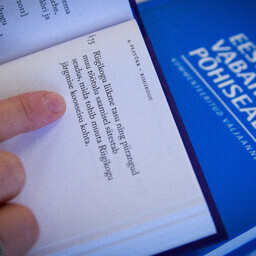Ülle Madise ütles, et
riigieelarve seaduse muudatus
ei tekita vastuolu põhiseadusega. Ta jäi oma varasema arvamise juurde, et
tegevuspõhine aastaeelarve
ei vasta Eesti põhiseadusele. Seda eelarvet esitati riigikogule alates 2020. aastast.
riigieelarve seaduse muudatus
Tõlge fraasile: riigieelarve seaduse muudatus
EN
state budget law amendment
tegevuspõhine aastaeelarve
Tõlge fraasile: tegevuspõhine aastaeelarve
EN
activity-based annual budget
Eesti põhiseaduse järgi on
riigieelarve koostamine
riigikogu ülesanne
. Nii praeguse seaduse kui ka uue eelnõu järgi jäävad osad valdkonnad
valitsuse otsustada
. Madise arvates on
riigieelarve üle otsustamine
läinud parlamendi käest valitsuse ja ministeeriumite kätte.
riigieelarve koostamine
Tõlge fraasile: riigieelarve koostamine
EN
compilation of the state budget
riigikogu ülesanne
Tõlge fraasile: riigikogu ülesanne
EN
task of the parliament
valitsuse otsustada
Tõlge fraasile: valitsuse otsustada
EN
government's decision
riigieelarve üle otsustamine
Tõlge fraasile: riigieelarve üle otsustamine
EN
decision-making on the state budget
Rahandusministeeriumi eelnõu ei muuda aastaeelarve olemust. Madise leidis, et põhiseaduse järgi peab riigikogu iga aasta jaoks kehtestama
riigi tulude ja kulude eelarve
. Riigikogu annab valitsusele raha kulutamiseks ja vajadusel teeb muudatused.
riigi tulude ja kulude eelarve
Tõlge fraasile: riigi tulude ja kulude eelarve
EN
budget of state revenues and expenditures
Madise ütles, et ta on rahul, et eelnõus on täpselt kirjeldatud, kuidas
toetusi anda ja tagasi nõuda
. Samuti on reguleeritud
viiviste ja intresside arvestamine
. Ta kiitis ka seda, et
valitsuse reservide moodustamine
ja kasutamine on täpsemalt kirjeldatud.
toetusi anda ja tagasi nõuda
Tõlge fraasile: toetusi anda ja tagasi nõuda
EN
grant and reclaim subsidies
viiviste ja intresside arvestamine
Tõlge fraasile: viiviste ja intresside arvestamine
EN
calculation of penalties and interest
valitsuse reservide moodustamine
Tõlge fraasile: valitsuse reservide moodustamine
EN
formation of government reserves
Eelmisel kümnendil hakkas Eesti kasutama tegevuspõhist riigieelarvet. 2020. aasta eelarve oli esimene, mis oli tehtud täielikult
tegevuspõhisel põhimõttel
.
tegevuspõhisel põhimõttel
Tõlge fraasile: tegevuspõhisel põhimõttel
EN
on an activity-based principle
Ülle Madise said that the amendment to the State Budget Act does not create a conflict with the Constitution. She maintained her earlier opinion that the activity-based annual budget does not comply with the Estonian Constitution. This budget has been presented to the Riigikogu since 2020.
According to the Estonian Constitution, the preparation of the state budget is the responsibility of the Riigikogu. Both under the current law and the new draft, some areas remain to be decided by the government. In Madise's view, the decision-making power over the state budget has shifted from the parliament to the government and ministries.
The Ministry of Finance's draft does not change the nature of the annual budget. Madise found that according to the Constitution, the Riigikogu must establish a budget for state revenues and expenses each year. The Riigikogu allocates funds to the government for spending and makes changes if necessary.
Madise said she was pleased that the draft precisely describes how to grant and reclaim subsidies. It also regulates the calculation of delays and interest. She also praised that the formation and use of government reserves are described in more detail.
In the previous decade, Estonia began using an activity-based state budget. The 2020 budget was the first to be fully based on the activity-based principle.

